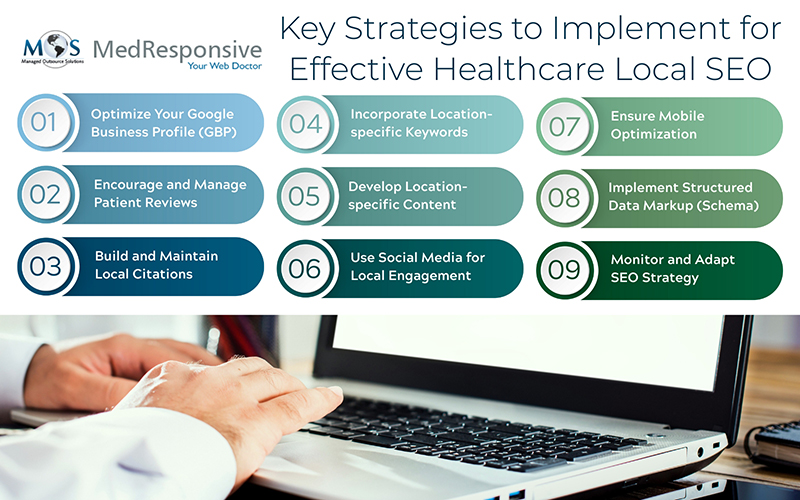Imagine this scenario where a patient in your area is urgently searching online for “dentist near me” or “best ENT specialist in my city.” If your healthcare clinic is not optimized for local search, you’re unknowingly missing out on potential patients who are actively seeking your services.
In the present digital age, patients are increasingly turning to the internet to find healthcare-related services. According to a National Institutes of Health (NIH) report, the number of healthcare searches on Google is above a staggering 1 billion every day. Moreover, 75% of patients rely on online searches to find doctors, dentists, and medical care providers. This shift underscores the critical importance of local SEO for healthcare practices aiming to attract and retain patients in their vicinity.
However, executing an effective local SEO plan requires expert knowledge of optimization practices, technical SEO proficiency, and timely effort. As healthcare practitioners need to focus on patient care, delegating this task to medical SEO services is an alternative option proven to deliver desired results.
In this post, we shall discuss in detail the best local SEO strategies for medical practices that will help your clinic stand out in local search results.
Top Healthcare Local SEO Checklist for Clinics
Build a Strong Local SEO Foundation
- Optimize Your Google Business Profile (GBP)
Your Google Business Profile is your clinic’s very first online identity and also the first impression potential patients will have regarding your practice. This makes it a core element of any local healthcare marketing strategy. Therefore, it is important to do the following to make the most out of it:
- Complete Your Profile: Confirm the accuracy and completeness of NAP details viz., clinic name, address, phone number along with website, and business hours.
- Choose Relevant Categories: Select appropriate categories like “Dentist,” “Cardiologist,” or “Multispecialty Hospital” to help Google understand your services.
- Upload High-quality Photos: Add images of your clinic, staff, and facilities to increase engagement and credibility.
- Regular Updates: Ensure you regularly post updates regarding services, offers, and health tips to keep your profile active.
- Reply to Reviews: Proactively encourage patients to write reviews and respond professionally to build trust.
An optimized GBP boosts your chances of appearing in Google’s local 3-pack, which significantly enhances your visibility.
- Encourage and Manage Patient Reviews
Online reviews play a vital role in local SEO rankings and influencing patient decisions. Here’s what to do to leverage them:
- Ask for Reviews: After appointments, politely request satisfied patients at checkout or in a follow-up email to leave reviews on platforms like Google, Yelp and other social/medical platforms. This helps enhance your online reputation management for healthcare.
- Respond Promptly: Make sure to address both positive and negative reviews professionally to show that you value all kinds of patient feedback.
- Highlight Testimonials: Feature positive reviews on your website and social media to build trust with potential patients.
- Review Analysis: Conduct a patient review analysis on a regular basis to study feedback, identify areas of improvement, understand patient preferences, and take informed decisions that improve the overall patient experience.
Consistent, positive reviews not only enhance your reputation but also signal to search engines that your practice is trustworthy and relevant.
- Build and Maintain Local Citations
Citations, essentially mentions of your clinic’s NAP information on external websites, are crucial for building strong SEO strategies for clinics and hospitals. Follow the below-mentioned practices to build and maintain them:
- Post in Relevant Directories: Ensure your practice is listed in healthcare directories like Healthgrades, WebMD, Vitals, and general directories like Yelp and Yellow Pages.
- Ensure Consistency: Your NAP details should maintain uniformity across all platforms to make sure search engines and potential patients pick up without any confusion.
- Leverage Citation Management Tools: With a number of tools like Moz Local or BrightLocal available, you can use them to automate the process of finding and correcting inconsistencies.
- Clean Up Duplicate Listings: Search engines might view inconsistent or duplicate listings as conflicting signals, which reduce your visibility. Clean up duplicate or outdated entries either by merging, deleting, or correcting all listings across directories using tools like BrightLocal.
Citations are crucial for building a strong SEO for medical practice marketing. It can help improve your practice’s credibility and search engine rankings—organically.
Create Localized Content That Ranks
- Incorporate Location-specific Keywords
Make use of location-specific keywords to help your practice appear in searches relevant to your area. Follow these practices to implement it effectively:
- Identify Relevant Keywords: Use tools like Google’s Keyword Planner to find keywords that combine your services with your location, such as “plastic surgeon in Manhattan.” Categorizing search intent into high intent, medium intent, and low intent keywords will help prioritize relevant terms and target various stages of the patient journey.
- Integrate Keywords Naturally: Include these keywords in your website content, blog posts, meta descriptions, and header tags naturally (it shouldn’t feel like keyword stuffing/spamming).
- Optimize for Voice Search: Consider how people speak when searching on mobile devices or using voice assistants by including conversational and question-based search terms in your content. Practices that optimize for these local long-tail keywords are better positioned to rank for voice queries and outrank competitors that optimize only for text-based queries.
By focusing on local keywords, you make your content more relevant to both patients and search engines.
- Develop Location-specific Content
Creating location-based content for hospitals and clinics that caters to your local audience enhances your SEO efforts and supports patient acquisition online. To do this:
- Write Localized Blog Posts: While generic health articles can help with traffic, publishing content that is tied to your location and its people is what truly connects your practice with local visibility. Creating blogs addressing health concerns specific to your community or providing information on local health events will help build trust and credibility.
- Develop Location-based Landing Pages: Create custom pages for each of your practice’s locations, such as services, staff, and equipment, entailing the services offered by each facility.
- Engage with the Community: Feature community events or health initiatives your practice participates in to strengthen local connections.
Engaging and informative local content establishes your expertise and relevance in the community.
- Use Social Media for Local Engagement
While social media may not directly increase your rankings, it plays an important role in connecting with local audiences and boosting the local visibility of your practice. Here’s how you can utilize social media platforms to your maximum benefit:
- Leverage Visual Content: As social media is an inherently visual-rich platform, you can use aesthetically pleasing visual materials such as images, infographics, or short clips to capture user attention. Consistent and scheduled posting is key to maintain active user engagement and keep potential patients aware of your services.
- Gather Social Proof: One of the key advantages of social media is the ability to build trust and transparency by incorporating user-generated content into your posts. Invite your patients to leave testimonials or comments on platforms such as Facebook or X, using hash tags relevant to your location.
- Respond promptly and professionally: It isn’t enough to simply post and leave; you should actively monitor and interact with user comments through timely, professional responses. Answer user questions, address patient concerns, and thank users for positive feedback to foster better relationships and improve engagement.
When aligned with SEO efforts, a strong social media presence not only increases your brand’s reach but also builds trust and long-term visibility within your healthcare community.
Optimize Technical and User Experience Elements
- Ensure Mobile Optimization
With the majority of patients searching for healthcare services on their mobile devices, having a mobile-friendly website has become the need of the hour. To optimize for mobile, meet the following requirements:
- Responsive Design: Ensure your website adapts to various screen sizes such as smartphone, tablet, or desktop for optimal viewing. Prioritize user experience by preventing awkward zooming or horizontal scrolling with a responsive design that automatically adjusts across all devices.
- Fast Loading Times: Aim for load times under three seconds to reduce bounce rates. Slow loading sites frustrate users and increase bounce rate, so optimize loading times by compressing images, minimizing scripts, and using content delivery network (CDN).
- Simplify Navigation: Make it easy for users to find information and book appointments on mobile devices. Design website to include features such as clear menus, large buttons, and actionable CTAs for intuitive navigation and ease of use.
- Clickable Contact Information: Include clickable phone numbers and a user-friendly appointment booking form. A mobile-friendly appointment booking form ensures that patients can easily find and complete actions on small screens, increasing the likelihood of direct conversions from mobile devices.
A mobile-optimized website improves user experience and enhances your ranking in local search results.
- Implement Structured Data Markup (Schema)
Structured data markup helps search engines understand the content of your website better, which can improve your chances of appearing in rich snippets and local packs. To implement this:
- Use Medical-specific Schema: Implement schema markup specific to healthcare providers, such as the “MedicalOrganization” and “Physician” schema types.
- Enhance Rich Snippets: Use schema markup to display additional information in search results, such as reviews, operating hours, and services offered.
- Test and Validate: Use Google’s Structured Data Testing Tool to ensure your schema markup is implemented correctly.
Structured data markup is a powerful tool for medical SEO optimization, helping you stand out in rich results. Proper use can enhance your search engine visibility and thus build credibility.
Track Results of Your Local SEO Efforts
- Monitor and Adapt SEO Strategy
Implementing the right steps at the right time is critical to achieve success in any optimization strategy. Local SEO can take time to show results, but measuring the impact of your strategies is crucial to ensure desired goals and long-term growth for your website. Here’s how you can track the performance of your SEO efforts:
- Set Realistic Goals: Before tracking your strategies, set realistic goals about your medical SEO strategies. Focus on key metrics such as organic traffic, keyword rankings, and conversion rates to know how patients discover and visit your practice. These insights will guide you to understand which strategies are working, what needs improvement, and make data-driven adjustments as needed.
- Leverage Analytics and Search Tools: Use tools like Google Search Console to track how your practice’s pages perform in local search. Monitor metrics such as impressions and clicks for search terms that include your services and city to identify which keywords are driving traffic and which pages attract attention. Google Analytics complements this by providing insights into user behavior, including time spent on page, bounce rate, and conversions related to booking or contact forms.
- Track Competitors: Keep an eye on how your competitors are performing in local search. Analyze their keywords, content strategies, and backlink profiles to identify opportunities or gaps in your own approach. Tools like SEMrush, Ahrefs, or Moz can help you benchmark your SEO efforts against competitors and stay ahead in your market.
Measuring your progress regularly allows you to stay on track, spot improvements, and implement data-driven insights to drive growth of your practice.
Strengthen Your Practice with Smart Local SEO Blueprint
Implementing these nine local SEO strategies can significantly enhance your healthcare practice’s online visibility, attract more patients, and establish a strong presence in your local community. By focusing on optimizing your Google Business Profile, managing patient reviews, building local citations, incorporating location-specific keywords, creating localized content, leveraging social media for local engagement, ensuring mobile optimization, implementing structured data markup, and continuously monitoring and adapting your SEO strategy, you position your practice for sustained growth in the digital age.
Whether you are running a single clinic or multi-location practice, these strategies can help you connect with your target audience, improve online visibility, and drive meaningful results. If you need assistance with local SEO for your healthcare practice, consider partnering with experts who specialize in healthcare digital marketing services to achieve the best results.





